Edie Melson's Blog, page 11
June 23, 2025
Dipping the Quill Deeper: Humble Beginnings (Part 5)
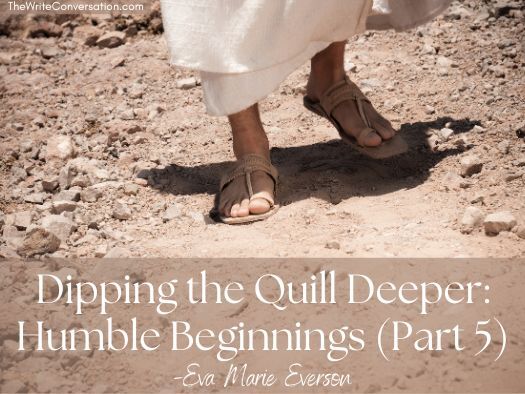
by Eva Marie Everson @EversonAuthor
Over the past few months, we’ve looked at stories of “humble beginnings,” specifically the stories behind the phenomenal success of Jerry B. Jenkins (The Left Behind series), the movie It’s a Wonderful Life, and the reading of a book titled When Choice Becomes God, which led a young, pregnant, unwed woman to choose life for her unborn child.
This leads us to the final story, one that begins in 1858 Boston.
His name was Edward Kimball, and he was a Sunday school teacher of teenaged boys. One in particular, a 16-year-old named Dwight, tugged at the heartstrings of Mr. Kimball. The previous Sunday, Mr. Kimball had asked his students to turn to the Book of John, which everyone did easily. All but one . . . Dwight. Dwight was unfamiliar with the Bible, so finding the fourth gospel didn’t come naturally.
Mr. Kimball felt a nudge from the Holy Spirit to reach out personally to young Dwight, who worked at a shoe store. At first, Mr. Kimball thought he shouldn’t interrupt Dwight’s workday—or possibly embarrass him—but the Holy Spirit wouldn’t let up. So, he went to the store. There, Mr. Kimball led the young man to the Lord.
Young Dwight went on to become one of the most influential evangelists of the church. We know him, fondly, as D. L. Moody, who—it is said—led over a million people to Christ in his lifetime.
Fast Forward
A few years down the road, D. L. Moody was preaching in England. In the audience sat another preacher, F. B. Meyer, who—by his own standards—had become lackadaisical in his zeal for the Lord. But hearing Moody that day kindled a spark that led Meyer to bring the gospel message back to the United States, where he regularly spoke in universities, something common in those days.
During one sermon, one particular student was moved to accept Jesus. His name was Wilbur Chapman.
Wilbur Chapman went on to preach extensively. Another common practice in those days was to bring Christian athletes to campuses where they would share their testimony and faith. Mr. Chapman employed a baseball player named Billy Sunday to work alongside him.
At some point, Billy led a revival in Charlotte, North Carolina. Because of that physical revival, spiritual revival broke out. But, like most good things, the physical revival had to come to an end—Mr. Sunday had other engagements and obligations to meet.
And Then Came Mordecai
Not wanting this good thing to come to an end, Charlotte’s businessmen went to Mr. Sunday and asked if he might suggest a replacement. His answer? Mordecai Ham.
Mordecai F. Ham Jr. might easily be described as a controversial preacher. He held anti-Semitic ideas but at the same time stated that Christians should never hate Jews because “through him came the Christ and your Bible. The best, the greatest and the only perfect man who ever lived on earth was a Jew by race.”
During his time in Charlotte, Mr. Ham didn’t draw the crowds or strike the enthusiasm as Billy Sunday had. He gave altar calls, but not a lot of people came forward. Then, one night—some say it was the final night of the revival—a young, lanky, local teenager—a dairy farm worker known to family and friends as Billy Frank—came to the meeting with a few friends. At the end of the sermon, Billy Frank made his way to the altar to give his life to Jesus.
Today, Billy Frank is known with the greatest of affection as the Reverand Dr. Billy Graham.
Dr. Graham preached for 55 years, spoke to 125 million people face to face and reached over two billion people through television and other forms of media. But his story didn’t begin that night listening to the sermon of Mordecai Ham. As far back as we can trace it, it began in a shoe store (or perhaps, you may say, a Sunday school room) in the middle of 19thcentury, Boston.
Who knows where it began before that . . .
Humble beginnings . . .
What about your story? Where does it begin? Who told you about Jesus? Who told that person? How far back can you trace it?
TWEETABLEDipping the Quill Deeper: Humble Beginnings (Part 5) from @EversonAuthor on @EdieMelson (Click to Tweet)
Don't Miss the Other Posts in this Series! HUMBLE BEGINNINGS, PART 1 HUMBLER BEGINNINGS, PART 2 HUMBLE BEGINNINGS, PART 3 HUMBLE BEGINNINGS, PART 4 HUMBLE BEGINNINGS, PART 5
 Eva Marie Everson is the CEO of Word Weavers International, the director of Florida Christian Writers Conference, and the contest director for the Blue Ridge Mountains Christian Writers Conference. She is the author of almost 50 books, both fiction and nonfiction. Her next novel, Beth Bettencourt, is set for release in 2026 (Kregel). To know more about Eva Marie (or to be added to her Southern newsletter), you can connect with her at www.EvaMarieEversonAuthor.com
Eva Marie Everson is the CEO of Word Weavers International, the director of Florida Christian Writers Conference, and the contest director for the Blue Ridge Mountains Christian Writers Conference. She is the author of almost 50 books, both fiction and nonfiction. Her next novel, Beth Bettencourt, is set for release in 2026 (Kregel). To know more about Eva Marie (or to be added to her Southern newsletter), you can connect with her at www.EvaMarieEversonAuthor.com
Published on June 23, 2025 22:00
June 21, 2025
The Importance of Taking Time to Refocus My life as a Writer and a Christ-follower

by Edie Melson @EdieMelson
You do not want a sacrifice, or I would give it; You are not pleased with a burnt offering. (Psalm 51:16 HCSB)
I don’t know about you, but I’m a doer. No matter how hard I try, I can’t seem to help myself. And while I have made some improvement over the years, unless I’m really focused, I’m going to judge my day, my progress, even my worth, on the things I’ve accomplished.
I know in my head that a check mark by everything on my to do list isn’t synonymous for how good I’m doing. Unfortunately, I just can’t seem to get my feelings to switch over to this way of thinking. This unhealthy outlook permeates every part of my life, especially spiritually. I keep acting like I can win God’s favor by doing more.
There was a time in my writing life when I was working seven days a week. I was writing blogs, publishing articles, writing and submitting manuscripts to be turned into books, etc. I was a busy bee for God's kingdom. But my busyness had changed my focus of being with God to doing things for God. Inevitably that kind of pace and focus ended with me in a pile of exhaustion and chaos.
And that was when I admitted to God that it was time to refocus my life.
From my collapse, God rebuilt me from the ground up. He showed me that being a Christ-follower has its emphasis on the state of being verb, rather than an action verb.
God has always been more interested in the process rather than the product.
I came to understand that God is relationally, not task oriented. Whatever needs doing, He can do. He uses us to accomplish His will—not to keep us busy or because He Himself doesn’t have the time. He allows us to join Him where He’s working because of the relationship.
God wants to spend time with me. He wants me to be so familiar with His voice that I can instantly hear and respond when He calls my name. But when I fill my life with things I have to do, my focus drifts, as things and tasks capture my attention and draw me away from the relationship.
So I've learned to be constantly adjusting the focus of my life. I'm looking at the person of God and making sure my plans including spending more time with Him, instead of for Him. Today I'm inviting you to join me!
TWEETABLEThe Importance of Taking Time to Refocus My life as a Writer and a Christ-follower from @EdieMelson (Click to Tweet)
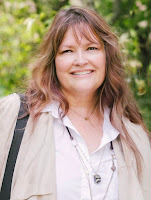 Edie Melson is a woman of faith with ink-stained fingers observing life through her camera lens. She’s a writer who feels lost without that device & an unexpected speaker who loves to encourage an audience. She also embraces the ultimate contradiction of being an organized creative. She knows the necessity of Soul Care and leads retreats, conferences & workshops around the world on staying connected to God. Her numerous books, including the award-winning Soul Cares eries & reflect her passion to help others develop the strength of their God-given gifts. Her blog, The Write Conversation is recognized as one of the top 101 industry resources.
Edie Melson is a woman of faith with ink-stained fingers observing life through her camera lens. She’s a writer who feels lost without that device & an unexpected speaker who loves to encourage an audience. She also embraces the ultimate contradiction of being an organized creative. She knows the necessity of Soul Care and leads retreats, conferences & workshops around the world on staying connected to God. Her numerous books, including the award-winning Soul Cares eries & reflect her passion to help others develop the strength of their God-given gifts. Her blog, The Write Conversation is recognized as one of the top 101 industry resources. She and husband Kirk have been married 40+ years and raised three sons. They live in the foothills of the Blue Ridge Mountains and can often be found hiking—with Edie clinging to the edge of a precipice for the perfect camera angle and Kirk patiently carrying her camera bag and tripod. Connect with her on her website, WWW.EDIEMELSON.COM and through social media.
Published on June 21, 2025 22:00
June 20, 2025
Using God’s Blueprint to Face the Jericho Battles in Our Writing Lives

by Edie Melson @EdieMelson
As I mentioned many of us are newly home from recent conferences like the Blue Ridge Mountains Christian Writers Conference, the Well, and Write to Publish. Today I’d like to amplify my post Coming off a Writing High is a Great Time for Soul Care with something God showed me after I published that post.
The other morning I was reminded of a truth from a friend (thank you Beth Vogt ). We all encounter what she calls Jericho seasons—in life and in writing.
When I hear references to Jericho I’m reminded of the church school song that says over and over again “Joshua fought the battle of Jericho!”
Great song, totally incorrect lyrics. If we go back to Scripture, we discover how—at best—Joshua was pretty much a spectator for that battle. It was God who fought, and won, that day (Joshua 6).
Joshua organized the people, from God’s explicit instructions, and got them all moving in the right direction. But he didn’t lift a hand to bring down that wall.
Instead, with the enemy jeering and threatening, Joshua led the people in praise—active praise—for six days. Then on the seventh day, he led them to be actively silent. And then directed them to unleash Gods power with a mighty shout and the walls came a tumbling’ down (to quote the song).
Let’s go back a few weeks and look at what had just happened to the Israelites.
They had crossed the flood-stage Jordan River because God made a way and stopped the water (Joshua 3). So, they were coming off an incredible high. I imagine they looked at Jericho and even with its high walls and fearsome army they felt like they could do anything. Why wouldn’t they feel this way? God was with them and would make them invincible!
And yet God knew them. He knew their tendency to be discouraged and also their emotional, mental, and physical exhaustion after coming off a spiritual high.
Now consider where many of us as writers have been. We’ve just crossed our own Jordan Rivers into the promised land by attending a writing conference. I don’t know about you, but gathering with other writers—called by God—feels a lot like visiting the promise land.
And I got home, high with what God showed me and how He equipped me—ready to tackle the world! And then I see Jericho. Your Jericho may be different than mine. It could be family issues, technology issues, platform challenges—anything that stands between us and what God has called us to do.
I look at these fortified issues a lot of different ways—depending on what’s happened recently in my life. But when I return home, high with success and calling, I tend to want to just begin attacking. And yet I’ve learned to stop and remember that “the battle is the Lord’s.”
And I go into Jericho mode. I begin active praise and wait on God’s timing as HE works to conquer the obstacle in my path.
Steps I take when I return home from a writing conference:
1. I unpack. I don’t just empty my luggage and put away my computer. I take time to pull out and look at a lot of thingsEmotions.Spiritual meetings with God, writing down what I heard so I don’t forget it. This includes writing down Bible verses that showed up while I was at the conference. These verses could be ones in a keynote, devotion, or class. Or they might be something God brought to mind during a specific time while I was away.Encouragement from others, again writing down what I heard so I rememberMoments of discouragement, yep, I write these down too. I can learn as much, or more, from challenges as I can from the victories.
2. I take time to renew my physical and emotional health. This may mean sleeping in, reading, taking long walks—NOT scheduling appointments or meetings for several days—or just hanging out with friends.
3. I set aside time every day to praise God. Not just for what He has done, but for what He has planned to do in the future. My time to praise God isn’t just verbal, I also keep a gratitude journal as part of my bullet journal system. I’ve found that unless I write down what I’m thankful for regularly, I tend to be a very ungracious person.
4. I evaluate my Jericho(s). I ask myself:What obstacle(s) am I facing?What is God asking me to do regarding each obstacle?Am I willing to do nothing and let God do the fighting?
5. I wait on God to work. I do the things I’m certain He’s asked me to do and I wait until I have clear direction regarding my Jericho.
So today I encourage you to join me. Whatever battle you’re facing—and I know you have one—stop. Begin actively praising God and wait on Him to act. Be silent when He calls on you to, and ready to shout when the victory He has orchestrated comes to pass!
And now it’s your turn, what steps do you take to move forward when you come home from a writing conference? Be sure to leave your thoughts in the comments section below.
Don't forget to join the conversation!Blessings, Edie
TWEETABLEUsing God’s Blueprint to Face the Jericho Battles in Our Writing Lives from @EdieMelson (Click to Tweet)
 Edie Melson is a woman of faith with ink-stained fingers observing life through the lens of her camera. No matter whether she’s talking to writers, entrepreneurs, or readers, her first advice is always “Find your voice, live your story.” As an author, blogger, and speaker she’s encouraged and challenged audiences across the country and around the world. Her numerous books reflect her passion to help others develop the strength of their God-given gifts and apply them to their lives. Connect with her on her website, through Facebook, Twitter and Instagram.
Edie Melson is a woman of faith with ink-stained fingers observing life through the lens of her camera. No matter whether she’s talking to writers, entrepreneurs, or readers, her first advice is always “Find your voice, live your story.” As an author, blogger, and speaker she’s encouraged and challenged audiences across the country and around the world. Her numerous books reflect her passion to help others develop the strength of their God-given gifts and apply them to their lives. Connect with her on her website, through Facebook, Twitter and Instagram.
Published on June 20, 2025 22:00
20 Things I've Never Done as a Writer … Or Have I?

by Ane Mulligan @AneMulligan
There are lots of posts in cyberworld, of things you've done or never done. I decided to play with that.
1. Killed a character: I've never killed one. I don't write suspense. Don't get me wrong, I've put a couple in jail, but no real bloodshed.
2. Gotten a 1-star review: I've had a few, not too many. I know fiction is 100% subjective, and there's no counting for taste. I'll stop there without any snarky remarks (although I have plenty in my arsenal).
3. Cried over editor notes: Nope. I kicked a few cabinets in my time but quickly realize how much better my editor makes me sound. I no longer kick cabinets. It can get costly.
4. Lost NANOWRIMO: I've never been a fast writer. Although, during Covid when I couldn't do anything but stay home and write, I discovered I could. But I sitll lost in NANOWRIMO.
5. Drank a whole pot of coffee: What's the problem with this? Coffee adn chocolate ate two of the four major food groups.
6. Gotten a rejection latter: Oh, please. I could wallpaper my office with all the ones I got over the years. They are stepping stones to success. Period.
7. Mixed its with it's: Nope. My mother was an elementary school teacher. She made sure I knew those things. The only one that continues to give me pause is effect vs affect. But I keep a sticky note on my screen for that one.
8. Wrote while at a coffee shop: Of course! All writers have an ancillary office. I get energized being around people … especially ones I don't have to talk to. The white noise helps me focus, which is strange because I'm ADD. I don’t know how it works—it just does.
9. Stayed in pajamas all day: Only if I'm sick. I must admit, though, if I don't have to go anywhere, I tend to stay in my jams until at least 10:00 AM.
10. Forgotten a character's name: Rarely, but it does happen. I keep lists—alphabetized by both last and first name. I also add their relationship to the main character.
11. Changed a character's name: Most definitely. For me, names are extremely important. They have to work with the character's personality. I've had characters refuse to continue telling me their story until I changed their name. I even had my kids ask to change their names.
12. Obsessed over adding or deleting a comma: Hasn't every writer?
13. Cried while writing an emotional scene: This is an absolute must. If I want my readers to cry, it'd better make me cry. My goal is to make my readers laugh out loud and weep at the tender scenes.
14. Deleted an entire chapter: Often. If it doesn't work, cut it. I've even deleted a nearly half completed WIP. If it doesn't fit my brand - kill it. Hmm, harkening back to #1, maaybe I have killed a character—several with one keystroke!
15. Added or deleted a POV: I have. It helps if you are good at weaving. But if you need more word count, adding another POV works. But just make sure their plotline adds value to the story. And if you delete a POV, you will usually have to weave in their storyline through dialogue without sounding like an info dump. Who ever said this gig was easy?
16. Got distracted with Facebook: No. I allow myself so much time doing social media and stick to it.
17. Been asked, "Where do you get your ideas?" All the time. Ideas are all around us. My problem is I'll never live long enough to write them all.
18. Brainstormed in the shower: Good gravy yes! I even have a small waterproof white board in mine. If I'm brainstorming alone, I sometimes use sticky notes, jot down an idea, and slap it on my bulletin board. I can move them around, toss what doesn't work, and keep what does.
19. Talked out loud to a character: Yes. And people used to look at me strange, however, I fixed that. I got an ear bud. When it's in, they think I'm on the phone. And yes, I can conference call if I need two characters to hash out something.
20. Obsessed over word count: Confession time. I do. Especially when I'm in that saggy middle of the story. How can I make this exciting without getting to the end right now? That's when I wish I was more of a plotter. However, a good brainstorm session always helps me get back on track.
My score? Uhm … 4. But then, if #14 counts, then my score is 3.
TWEETABLE20 Things I've Never Done as a Writer … Or Have I? from @AneMulligan on @EdieMelson (Click to Tweet)
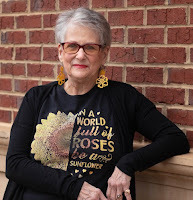 Ane Mulligan lives life from a director’s chair, both in theatre and at her desk creating novels. Entranced with story by age three, at five she saw PETER PAN onstage and was struck with a fever from which she never recovered—stage fever. One day, her passions collided, and an award-winning, bestselling novelist emerged. She believes chocolate and coffee are two of the four major food groups and lives in Sugar Hill, GA, with her artist husband and a rascally Rottweiler. Find Ane on her website, Amazon Author page, Facebook, Instagram, Pinterest, The Write Conversation, and Blue Ridge Conference Blog.
Ane Mulligan lives life from a director’s chair, both in theatre and at her desk creating novels. Entranced with story by age three, at five she saw PETER PAN onstage and was struck with a fever from which she never recovered—stage fever. One day, her passions collided, and an award-winning, bestselling novelist emerged. She believes chocolate and coffee are two of the four major food groups and lives in Sugar Hill, GA, with her artist husband and a rascally Rottweiler. Find Ane on her website, Amazon Author page, Facebook, Instagram, Pinterest, The Write Conversation, and Blue Ridge Conference Blog.
Published on June 20, 2025 11:14
June 19, 2025
Writer Beware—Don’t Compare
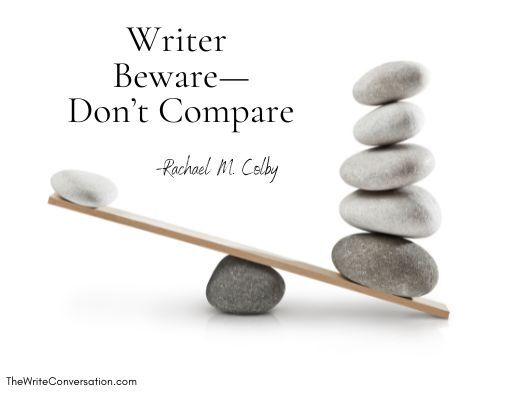
by Rachael M. Colby @RachaelColby7
Sometimes I think of other writers and chide myself for not being further along. Comparison is a wretched road that leads to self-doubt, discouragement, and discontent. When I compare my status with others, it drains my mental, emotional, and spiritual energy. I remind myself, start where you are. That’s where God meets us.
There is a chasm of difference between begrudging someone’s good fortune, abilities, or ministry, versus admiring and desiring their gifting and asking our heavenly Father to bless us likewise. Elisha asked for a double portion of the prophet Elijah’s spirit (a heart for God and His people, faith, anointing, and ministry) and received it. *1 To harbor envy because of someone else’s ability or success is like accusing God of denying what’s best for us. God is the good Father who delights in giving to His children and encourages us to bring all our requests to Him.
I’ve seen envy embitter and rob people of the joy of what they already possess. With God’s help, I choose to rejoice when others flourish. Doing so buoys my spirits even when personal circumstances threaten to crush me.
God makes the path, sets the pace, extends His hand toward us, and offers to patiently, lovingly lead us into the perfect plans He has for us.
God doesn’t reward or rebuke based on our type or level of gifting or the number of them. In Matthew 25:14–30, the master praised and rewarded the progress of the servant entrusted with two talents (a measure of money in biblical times), though he hadn’t produced as much as the one who had five. However, he rebuked the servant who failed to invest the one talent of money he’d been given, and instead, buried it.
We err when we focus on our lack and inability rather than on God’s ability to enable us to accomplish His will. He knows our weaknesses; He is our help. God is pleased and blesses us when we’re faithful stewards of what He’s given us. There are no insignificant tasks when we’re doing what God calls us to do.
As potters decide the use of the vessels they create, and their skilled craftmanship determines the value, so it is with us. We are clay, and Jesus—God incarnate, is the Master Potter.
For we are His workmanship, created in Christ Jesus for good works, which God prepared beforehand that we should walk in them. (Ephesians 2:10 NKJV)
Who are we to question the Maker? He makes no duplicates, so why compare? We aren’t the product of an assembly line, but intentionally created as one of a kind. Besides, comparing ourselves distracts us from preparing and fine tuning our skills for the work God has for us. It’s far more productive to hone what we have than to bemoan what we lack. Perhaps the reason our gifts and timing differ is because of whose needs we’re called to meet.
Pay careful attention to your own work, for then you will get the satisfaction of a job well done, and you won’t need to compare yourself to anyone else. (Galatians 6:4 NLT)
While I’m grateful for those who inspire, challenge, and teach me, I trust Jesus, the Master Artist, to define my identity and design my destiny.
What has God called you to do? Do that. What are your gifts? Don’t doubt them—develop them. We can attain nothing greater than fulfilling His will for our lives.
Sometimes Jesus dazzles with His beautiful, elaborate, multi-talented, high-producing, smooth-skilled creations. And sometimes He amazes by the mighty ways He uses the small and simpler things, the weaker ones (like me) who must depend on, lean on Him if we don’t want to misstep.
“Come,” He says, “follow Me.”
I often think of the words Jesus spoke to the apostle Paul. They hang on my office wall: And He said to me, “My grace is sufficient for you, for My strength is made perfect in weakness. Therefore most gladly I will rather boast in my infirmities, that the power of Christ may rest upon me.” (2 Corinthians12:9 NKJV)
The goal of faith-based writing isn’t self-exultation, but God’s glorification and the edification of others. If we focus on that, we’ll have nothing to be ashamed of, and nothing to be proud of either, because our gifting and the opportunity to serve with them are all given by God.
Every good gift and every perfect gift is from above, and comes down from the Father of lights, with whom there is no variation or shadow of turning. (James 1:17 NKJV)
*1 2 Kings 2:1-14
TWEETABLEWriter Beware—Don't Compare from @RachaelColby7 on @EdieMelson (Click to Tweet)
 Rachael M. Colby has a heart for reconciliation and a passion to uplift those who serve in tough places. She writes to connect cultures’ questions with Christianity’s answers, inspire faith, and motivate.
Rachael M. Colby has a heart for reconciliation and a passion to uplift those who serve in tough places. She writes to connect cultures’ questions with Christianity’s answers, inspire faith, and motivate.Rachael is an award-winning writer in the categories of articles, devotions, essays, poetry, flash fiction, and children’s picture books. She is a longtime member of The Jerry Jenkins Writers Guild and a protégé in the Cecil Murphey Mentoring program.
Her work has appeared in Chicken Soup for the Soul, the Blue Ridge Mountains Christian Writers Conference Blog, online publications, anthologies, and the Oak Ridger newspaper.
This Jamaican-born wife, mom, beach bum, artist, work in progress, makes her home in Cape Cod, Massachusetts. She runs on copious amounts of coffee, chocolate, and a whole lot of “Help me, Jesus,” and blogs at TattooItOnYourHeart.com.
Connect with Rachael through:(X) Twitter ): @RachaelColby7Facebook: Rachael M Colby Website: TattooItOnYourHeart.com
Published on June 19, 2025 22:00
June 18, 2025
Reasons to Grow Your Author Subscriber List Through Your Newsletter
Edie here! Today I'm excited to introduce you to our newest columnist on The Write Conversation, Kate Huff. Kate is a good friend and someone who has a passion to help writers grow their visibility through newsletters and subscription marketing. I know you'll enjoy her valuable contributions. Please give her a warm TWC welcome!

by Kate Huff @KateOliviaHuff
“Grow your newsletter subscriber list.”
These words are heard by every aspiring author at some point in his or her writing career. Usually, it’s heard fairly early in that career and can often cause many to wonder if writing is what they are called to do.
When facing this question, you may ask yourself, “Why do I really need a newsletter, much less a certain number of subscribers? I don’t even have a book to promote!”
Feel familiar? You’re not alone.
As a pre-published author with a BBA and marketing experience, I struggled to understand why I needed a robust subscriber list for something that wasn’t even published yet. Why couldn’t I just write my book?
Unfortunately, it’s not that simple. Publishers and agents want to know how many subscribers are on your newsletter list as part of your pitch. Marketing is slowly shifting to the author, and if you’re considering publishing it yourself, it’s solely up to you.
But what if you shifted your view on growing your subscriber base? Instead of it becoming another item on the long “to-do” list, it became a priority for engaging future readers?
What if you think of those subscribers as more than a list of emails to prove to the publisher you have someone to buy your book? What if you see them as future readers and you have the opportunity to deepen a connection with them?
Every new subscriber is a real person who’s chosen to hear from you directly. Those subscribers believe in you and the words you are writing. Your newsletter is an opportunity to speak to a subscriber individually. You are able to write words of truth and encouragement to a group of people consistently before your book comes out. It’s not just once every few years like your books, but every single month. What an honor!
I like to think about it this way. I’m not on stage speaking in front of 600 people every month. BUT, every month, over 600 people have invited me to their inboxes and have given me the opportunity to speak to them. I consider that a big deal. That’s trust. And that’s the power of building an audience.
Here are a few other practical reasons why newsletters are worth your blood, sweat, and tears.
8 Reasons Author Newsletters are Critically Important 1. You’re building a community, not just selling (or planning to sell) books. These are your people. They are the ones who believe in your stories, your voice, and your author journey. 2. You control the connection. Social algorithms can hide your posts or close your account for no reason, but an email list puts your words directly in your reader’s inbox when you want them there. 3. Readers buy from authors they trust. When people hear from you consistently, they begin to see you as a trusted resource. Trusted authors get pre-orders, reviews, and word-of-mouth buzz!4. Turn readers into superfans. A strong audience doesn’t just read your book. They tell everyone about it, write reviews, and come back for the next one. 5. Higher engagement. Emails, done well, consistently outperform social media in engagement. Subscribers are more likely to read, click, and engage with your content because they’ve chosen to be there and trust you! 6. It attracts more opportunities. Publishers, agents, and podcast hosts notice when you have an engaged following. It shows you’re not just writing, but you’re also building something that will last. 7. Stand out in a world full of distractions. Your audience learns your voice and all the things that make you unique.8. A strong subscriber base creates a writing career that lasts. Platforms change. Trends shift. But an email list of loyal readers? That’s your safety net and springboard.
Have I convinced you yet?
Building your subscriber list isn’t only about chasing numbers. It’s about nurturing trust, cultivating community, and creating a foundation that supports your writing dreams for the long haul.
Whether you’re just starting or trying to grow what you’ve already built, remember every name on your email list represents a reader who believes in you. So show up, serve them well, and keep writing. Your words matter. Your platform is how you make sure those words are heard.
TWEETABLEReasons to Grow Your Author Subscriber List Through Your Newsletter from @KateOliviaHuff on @EdieMelson (Click to Tweet)
 Kate Huff is a storyteller at heart and loves finding Gospel elements in all stories, especially fairytales. She believes fairytales that explain the Gospel in clear and captivating ways have the power to change the world, one person at a time. Her first manuscript is currently with an agent, and she’s working on her second fiction novel along with a few non-fiction projects.
Kate Huff is a storyteller at heart and loves finding Gospel elements in all stories, especially fairytales. She believes fairytales that explain the Gospel in clear and captivating ways have the power to change the world, one person at a time. Her first manuscript is currently with an agent, and she’s working on her second fiction novel along with a few non-fiction projects.
Kate works as a freelance content writer and newsletter pro. She has over twenty years of experience crafting content, specifically newsletters, across diverse sectors, including non-profits, sales, and fundraising. She helps authors and entrepreneurs create compelling newsletters that connect with their audiences and offers tailored content creation services, as well as training on how to build newsletters and grow subscriber bases.

by Kate Huff @KateOliviaHuff
“Grow your newsletter subscriber list.”
These words are heard by every aspiring author at some point in his or her writing career. Usually, it’s heard fairly early in that career and can often cause many to wonder if writing is what they are called to do.
When facing this question, you may ask yourself, “Why do I really need a newsletter, much less a certain number of subscribers? I don’t even have a book to promote!”
Feel familiar? You’re not alone.
As a pre-published author with a BBA and marketing experience, I struggled to understand why I needed a robust subscriber list for something that wasn’t even published yet. Why couldn’t I just write my book?
Unfortunately, it’s not that simple. Publishers and agents want to know how many subscribers are on your newsletter list as part of your pitch. Marketing is slowly shifting to the author, and if you’re considering publishing it yourself, it’s solely up to you.
But what if you shifted your view on growing your subscriber base? Instead of it becoming another item on the long “to-do” list, it became a priority for engaging future readers?
What if you think of those subscribers as more than a list of emails to prove to the publisher you have someone to buy your book? What if you see them as future readers and you have the opportunity to deepen a connection with them?
Every new subscriber is a real person who’s chosen to hear from you directly. Those subscribers believe in you and the words you are writing. Your newsletter is an opportunity to speak to a subscriber individually. You are able to write words of truth and encouragement to a group of people consistently before your book comes out. It’s not just once every few years like your books, but every single month. What an honor!
I like to think about it this way. I’m not on stage speaking in front of 600 people every month. BUT, every month, over 600 people have invited me to their inboxes and have given me the opportunity to speak to them. I consider that a big deal. That’s trust. And that’s the power of building an audience.
Here are a few other practical reasons why newsletters are worth your blood, sweat, and tears.
8 Reasons Author Newsletters are Critically Important 1. You’re building a community, not just selling (or planning to sell) books. These are your people. They are the ones who believe in your stories, your voice, and your author journey. 2. You control the connection. Social algorithms can hide your posts or close your account for no reason, but an email list puts your words directly in your reader’s inbox when you want them there. 3. Readers buy from authors they trust. When people hear from you consistently, they begin to see you as a trusted resource. Trusted authors get pre-orders, reviews, and word-of-mouth buzz!4. Turn readers into superfans. A strong audience doesn’t just read your book. They tell everyone about it, write reviews, and come back for the next one. 5. Higher engagement. Emails, done well, consistently outperform social media in engagement. Subscribers are more likely to read, click, and engage with your content because they’ve chosen to be there and trust you! 6. It attracts more opportunities. Publishers, agents, and podcast hosts notice when you have an engaged following. It shows you’re not just writing, but you’re also building something that will last. 7. Stand out in a world full of distractions. Your audience learns your voice and all the things that make you unique.8. A strong subscriber base creates a writing career that lasts. Platforms change. Trends shift. But an email list of loyal readers? That’s your safety net and springboard.
Have I convinced you yet?
Building your subscriber list isn’t only about chasing numbers. It’s about nurturing trust, cultivating community, and creating a foundation that supports your writing dreams for the long haul.
Whether you’re just starting or trying to grow what you’ve already built, remember every name on your email list represents a reader who believes in you. So show up, serve them well, and keep writing. Your words matter. Your platform is how you make sure those words are heard.
TWEETABLEReasons to Grow Your Author Subscriber List Through Your Newsletter from @KateOliviaHuff on @EdieMelson (Click to Tweet)
 Kate Huff is a storyteller at heart and loves finding Gospel elements in all stories, especially fairytales. She believes fairytales that explain the Gospel in clear and captivating ways have the power to change the world, one person at a time. Her first manuscript is currently with an agent, and she’s working on her second fiction novel along with a few non-fiction projects.
Kate Huff is a storyteller at heart and loves finding Gospel elements in all stories, especially fairytales. She believes fairytales that explain the Gospel in clear and captivating ways have the power to change the world, one person at a time. Her first manuscript is currently with an agent, and she’s working on her second fiction novel along with a few non-fiction projects. Kate works as a freelance content writer and newsletter pro. She has over twenty years of experience crafting content, specifically newsletters, across diverse sectors, including non-profits, sales, and fundraising. She helps authors and entrepreneurs create compelling newsletters that connect with their audiences and offers tailored content creation services, as well as training on how to build newsletters and grow subscriber bases.
Published on June 18, 2025 22:00
June 17, 2025
Write Anyway: Obedience in the Quiet Seasons
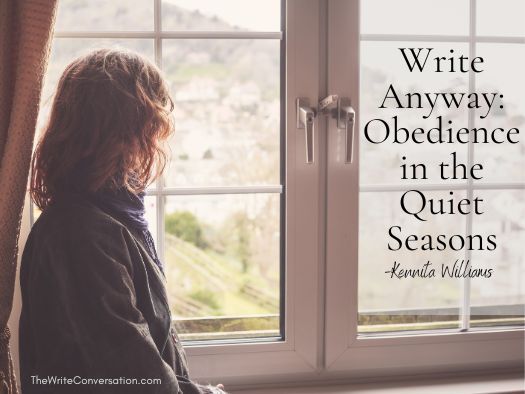
by Kennita (Kay) Williams
“Then the Lord replied: ‘Write down the revelation and make it plain on tablets so that a herald may run with it.’” – Habakkuk 2:2 (NIV)
There is a sacred hush that sometimes falls over the writing life. Not writer’s block—but holy silence. The kind where you have shown up, pen in hand or cursor blinking, heart wide open… and nothing comes. You begin to wonder: “God, are You still calling me to this?”
You are not alone.
Every Christian communicator—whether you are writing books, blogs, devotionals, or social posts—has faced a moment where the message feels muddled, the platform seems too quiet, or the calling grows too heavy to carry. It is in these places that we must remember we are not just writers. We are stewards. And obedience is not measured by likes, shares, or even by perfect clarity. It is measured by faithfulness.
When the Words Do not Flow
The prophet Habakkuk did not receive the vision during a mountaintop moment of inspiration. He was wrestling—deeply—with what he saw in the world around him. Violence, injustice, delay. Sound familiar?
But God did not rebuke him for questioning. Instead, He gave a charge:
“Write the vision.”
God’s instruction was not about perfect prose. It was about preserving the truth. Making it plain. Leaving a written record so that even when Habakkuk himself was not speaking, the message could still run ahead of him.
This is what we are called to do as Christian writers:
To capture what God reveals—even in fragments—and to offer it in humility and hope. Not for applause, but for impact. Not for speed, but for eternal purpose.
Obedience > Outcome
Some days, the words come like fire. Other days, they drip like dew. Either way, the call remains: Write anyway.
You may not always feel inspired. You may not always feel qualified. But your willingness to sit with God, to wrestle with truth, to steward the message He places in your heart—that is worship. That is obedience.
The enemy would love nothing more than to mute your message through discouragement or delay. He whispers things like:“Someone’s already said this.”“No one’s listening.”“You’re not ready.”“This isn’t good enough.”
But can I remind you today? The power of your words is not in your polish—it’s in your obedience. God breathes on yielded vessels, not perfect manuscripts. He anoints what is available, not what is flawless.
Write What He’s Showing You
There is someone who needs your story, your struggle, your testimony—not the polished version, but the present-tense version. The version that says, “I’m still learning,” or “I’m still healing,” or “I’m still trusting.”
Write from that place.
Write as you go.
Write while it’s raw.
Write while it’s still becoming.
The world does not need more copy-paste Christianity. It needs your voice—anchored in scripture, seasoned with grace, and flowing with authenticity. It needs your faithful “yes” in this season, even if the outcome is not clear yet.
A Prayer for the Writer
Lord, thank You for entrusting me with a message. Even when the words do not come easily, even when the path feels hidden—You are with me. Teach me to write from a place of intimacy, not industry. Help me to hear You clearly and to write with boldness. Not for validation, but for transformation. Not for perfection, but for obedience. May every word point back to You. In Jesus’ name, amen.
Clarity Comes as You Go
The miracle in writing often is not just what is produced—it is what is revealed in the process. As we put pen to paper, keys to keyboard, God shapes us. He speaks in between the sentences, whispers between the edits, and breathes life into places we thought were empty.
So today, do not wait for perfect timing. Do not wait for the perfect audience. Do not wait to feel ready.Write anyway.Because the message matters.Because God still speaks.And because someone is waiting to run with what you have been given.
Let this be your encouragement, dear writer: You are not behind. You are not disqualified. And you are not forgotten. If God called you to communicate His truth, He will give you what to say—one word at a time.Keep showing up.Keep writing.Keep believing.The vision still speaks.TWEETABLEWrite Anyway: Obedience in the Quiet Seasons from Kennita (Kay) Williams on @EdieMelson (Click to Tweet)
Dr. Kennita “Kay” Williams is a Visionary Leadership Coach, Author, Resilience Expert, and Wellness Advocate. Through her Business/Ministry, Clear Vision, she empowers leaders to navigate challenges, gain clarity, and lead with purpose. Dr. Kay’s mission is to inspire wholeness and healing. She can be contacted at www.clearvisionleader.com
Published on June 17, 2025 22:00
June 16, 2025
The Pursuit of Wisdom in the Writing Journey

by Katherine Hutchinson-Hayes @KHutch0767
Finding wisdom is a blessing, and understanding is invaluable.
Recently, I’ve been immersed in my home recording studio—what some might call my version of a creative workspace, equipped with a microphone, computer, and a headset. Many might be surprised to find out that I write suspense and devotions. I’m also a freelance editor and coach. However, the thriller genre captivates me so much that I launched a podcast a few years ago titled Murder Mystery and Mayhem Laced with Morality. The show has gained listeners from around fifty-four countries, with a growing audience of nearly 3,000. I’ve had the privilege of hosting numerous talented, award-winning authors and experts, which has been a thrilling experience for me!
Yet, none of this happened by chance. My journey into writing and podcasting was paved with knowledge, mentorship, and dedicated training. Transitioning from a career in education to writing wasn’t an easy feat. Before starting my podcast and embracing my writing career, I participated in workshops, sought mentorships, and engaged with various writing communities. Some pivotal moments that helped shape my career came from attending writing conferences, especially the Blue Ridge Christian Writers Conference (BRMCWC), and I’d like to share a few highlights.
One of my most significant turning points came during a one-on-one critique session with Edwina Perkins. Her candid feedback about my writing was exactly what I needed to hear. I later attended her self-editing workshop, which offered great insights for my writing process. Edwina also introduced me to my mentor, Cecil Murphey, whose encouragement inspired me to dive into thrillers, a genre I’ve always enjoyed.
At my first conference, I was inspired by Eva Marie Everson’s powerful talk about her critique group, Word Weavers. I knew I needed to be part of something like that, so I joined an online and in-person chapter. In that immersive experience, I connected with talented writers like Susan Simpson, Robin Luftig, Sarah Schwerin, and Tina Yeager, who became mentors through the group.
Attending a seminar on social media engagement led by Edie Melson and DiAnn Mills equipped me with strategies to improve my online presence. I left feeling ready to elevate my brand and connect with readers.
I also had the chance to meet Linda Goldfarb at a hands-on podcasting workshop, where I received practical tools I could implement right away. Additionally, I had the wonderful fortune of meeting Cynthia Ruchti on a flight to a writing conference. At the time, I didn’t know she was an award-winning author and a literary agent. Her professionalism and genuine nature made a lasting impression, and I later benefited from her workshop on staying productive while pursuing writing dreams.
After listening to Lisa Crayton's compelling keynote, I felt inspired to seek her guidance and take her classes. Her insights have motivated me, as have the wisdom and encouragement from many others at BRMCWC.
My passion for suspense and thrillers deepened after attending Killer Nashville, organized by Clay Stafford, where I gained valuable connections and learning opportunities.
This reflection is an homage to the wisdom of those I’ve been fortunate to encounter throughout my writing journey. Their generosity in sharing knowledge and insights has enhanced my path.
While I’m grateful for the mentors and role models I’ve met along the way, I recognize that true wisdom is something we all can cultivate. If we want to continue learning, growing, and gaining insight in our work, here are five approaches to consider:
5 Things to Consider as We Grow in Our Writing1. Recognize the Source of Wisdom: Understanding that true insight can come from various sources is crucial. Wisdom is often found in life experiences and lessons from others.
2. Ask for Guidance: Never hesitate to reach out for advice. Many seasoned writers and professionals are willing to share their knowledge—just ask!
3. Reflect on Learning: Take the time to think critically about your experiences and what they teach you. Reflection brings clarity and helps develop a well-rounded perspective.
4. Seek Constructive Feedback: Surround yourself with people who will offer honest, helpful critiques. Listening and being open to feedback is essential for growth.
5. Pursue Ongoing Learning: Embrace the journey of continuous learning. Read books, attend workshops, and engage with fellow writers to expand your knowledge and skills.
In the ever-evolving landscape of writing, the pursuit of wisdom is integral to our growth and success as writers. Each word we craft and every story we tell shapes our understanding of the world and ourselves. Facing the challenges that come with the writing process allows us to refine our voice and style. As we learn from our triumphs and failures, we pave the way for deeper insights and more compelling narratives. It’s this journey of continuous learning that enriches our writing and connects us to our readers on a profound level.
TWEETABLEThe Pursuit of Wisdom in the Writing Journey from @KHutch 0767 on @EdieMelson (Click to Tweet)
 Dr. Katherine Hutchinson-Hayes is a review board member and contributor to Inkspirations (an online magazine for Christian writers), and her writing has been published in Guideposts. Her work in art/writing is distinguished by awards, including the New York Mayor’s Contribution to the Arts, Outstanding Resident Artist of Arizona, and the Foundations Awards at the Blue Ridge Mountains Christian Writer’s Conference (2016, 2019, 2021). She is a member of Word Weavers International and serves as an online chapter president and mentor. She belongs to FWA (Florida Writers Association), ACFW (American Christian Fiction Writers), CWoC (Crime Writers of Color),
Dr. Katherine Hutchinson-Hayes is a review board member and contributor to Inkspirations (an online magazine for Christian writers), and her writing has been published in Guideposts. Her work in art/writing is distinguished by awards, including the New York Mayor’s Contribution to the Arts, Outstanding Resident Artist of Arizona, and the Foundations Awards at the Blue Ridge Mountains Christian Writer’s Conference (2016, 2019, 2021). She is a member of Word Weavers International and serves as an online chapter president and mentor. She belongs to FWA (Florida Writers Association), ACFW (American Christian Fiction Writers), CWoC (Crime Writers of Color),AWSA (Advanced Writers and Speakers Association), and AASA (American Association of School Administrators). She serves on the nonprofit organization Submersion 14 board and the 540 Writer’s Community board and is an art instructor for the nonprofit organization Light for the Future. Katherine hosts the podcast Murder, Mystery & Mayhem Laced with Morality. She has authored a Christian Bible study for women and is currently working on the sequel to her first general market thriller novel. Her thriller A Fifth of the Story will debut in February 2024 through Endgame Press.
Katherine flourishes in developmental editing and coaching writers. She has a twenty-year career in education, leadership, and journalism. Katherine freelances as an educational consultant for charter schools, home school programs, and churches. In this role, she has written and edited curriculum, led program development, and helped manage growth facilitating and public relations. She also works as an editor and book coach through her consulting business. Katherine provides skill, accountability, and professionalism so clients can begin, develop, and finish their writing projects for publication.
Published on June 16, 2025 22:00
June 15, 2025
Coming Off a Writing High is a Great Time for Soul Care
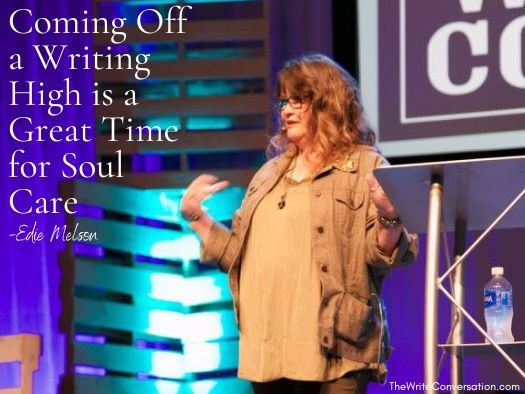
by Edie Melson @EdieMelson
Yep, you read that title correctly.
Soul care isn’t just for times when life is difficult.
I’m recently back from one of the highlights of my writing year—THE BLUE RIDGE MOUNTAINS CHRISTIAN WRITERS CONFERENCE. For me, this is a spiritual high. It’s a time when:I’ve heard from God Gotten to witness what He’s doing in my life and in the lives of other writers And a time when I’ve been able to fellowship with other believers who are also writers. I come back from this even like I do every year—overwhelmed, blessed, and absolutely exhausted.
As I said above, Soul Care isn’t just for times when life is difficult.
I’ve learned that exhaustion is exhaustion and even when it comes from a good source, it still means I have to take care of myself.
10 Things I Do to Care for My Writing Soul
1. I spend time in prayer and fellowship with God. Only God can renew my spiritual energy and only He can give me the right perspective on where to go from here.
2. I take some time doing other things I love to do. For me, that often involves my camera. The day after BRMCWC one year, I spent the day with my husband and best friend, DIANN MILLS and her husband Dean. We took a field trip to the Carl Sandburg home. My husband Kirk had several jokes about where writers go to rest, but we ignored him and had a marvelous time! And I took my camera and captures some fun images—inside the house of his workspace, typewriters and books—as well as pics of his garden and ground. It was a day that ministered to my creative heart.
3. I get extra rest. I’m not someone who likes to nap. I take pride in being an early-to-rise-and-early-to-bed sort of girl. But after this event, I’m tired and I need to set aside my pride and build in some extra sleep time to allow my body—and my mind—to recover.
4. I don’t give in to the guilt. Coming home from a trip means coming back to a mountain of a to-do list. But to do those things well will take some time. I didn’t get behind in a single day and I won’t get caught up in a single day.
5. I spend time with friends, especially friends who understand my writing gift. It helps me process when I share the highs and the challenges with someone I trust.
6. I wait to make important decisions. When I’m exhausted, I’ve found that I don’t think clearly. I need time to recuperate before I sign any contracts or make any life-altering career choices.
7. I acknowledge that after a high comes a low. It’s a natural progression. It’s not always fun, but when I know to expect a low, it’s much easier to deal with and it doesn’t derail my writing journey. Instead I accept it’s part of the process and I know “this too shall pass.”
8. I go outside and stay active. No this isn’t a contradiction to #3. My body needs healthy activity as much as it needs rest. Plus spending time in the sunlight has physical as well as mental benefits. I’m not running a marathon (I’m actually not running at all) but short walks help me reorient myself to normal life.
9. I watch what I eat. I’ve learned that when I’m exhausted, I tend to gravitate toward comfort foods. Too much of these foods, which for me are high in empty calories and starches, make me lethargic, depressed and fat. I indulge carefully and with an eye toward renewing my energy, not prolonging my exhaustion.
10. I read and write in my journal. One of things I urge writers to do during a conference is to write down the good stuff that happens. The reason is that when we get home and the lows come, we often don’t believe or second-guess the good things people have said and the God moments we’ve had. When the doubts creep in, I go back and read what I recorded and it gives me hope.
NOTE: So what if you didn’t record the good stuff that happened? It’s not too late. Take it to the Lord in prayer and ask Him to bring to your mind the ways He’s worked and the things others have said about your writing. Here are FOUR verses to remind you of the truth that God will answer you:Proverbs 8:17Deuteronomy 4:29Luke 11:9 – 10 Jeremiah 29:13
As long as we live on this earth, writers will need soul care. We must plug into the unending source of creativity if we want to continue and not burn out.
Now it’s your turn, how do you find Soul Care after a good thing has left you exhausted? Be sure to share your thoughts in the comments section below.
Don’t forget to join the conversation!Blessings, Edie
TWEETABLEComing Off a Writing High is a Great Time for Soul Care from @EdieMelson (Click to Tweet)
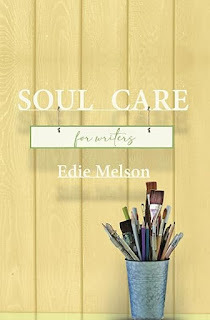 Soul Care for Writersby Edie Melson
Soul Care for Writersby Edie MelsonThe isolation, fear and doubt often associated with writing can bring weariness and discouragement. Soul Care for Writers provides short, practical, creative activities—specifically tailored to writers—to care for your fatigued soul when you are weary, discouraged, and have little time for rest and peace. Although this book is particularly applicable to writers, it can also be effectively used by anyone who finds themselves weary and discouraged.
This book inspires the reader and helps to realign those areas in writers’ lives which have gotten out of kilter. This book contains five chapters, each one with:DevotionsCreative exercisesPrayersJournaling exercisesScripture prescriptions for your situationsThis book uses the elements above toFight fearDefeat doubtBanish stumbling blocksConquer comparisonsFortify your faithEdie Melson helps you find Soul Care solutions using devotions, prayers and opportunities for creative expression. She has learned how sensory involvement deepens our relationship with the Father and gives rest to our weary souls. She will teach you to tap into your creativity—even if you think you’re not a creative soul.
Reconnect with God using your tactile creativity.
Warning! This book may become dog-eared and stained. Draw in it. Experiment with your creative passions. Learn the healing power of play. Allow God’s power to flow through creativity. Soul Care for Writers will become your heart treasure.
 Edie Melson is a woman of faith with ink-stained fingers observing life through her camera lens. She’s a writer who feels lost without that device & an unexpected speaker who loves to encourage an audience. She also embraces the ultimate contradiction of being an organized creative. She knows the necessity of Soul Care and leads retreats, conferences & workshops around the world on staying connected to God. Her numerous books, including the award-winning Soul Cares eries & reflect her passion to help others develop the strength of their God-given gifts. Her blog, The Write Conversation is recognized as one of the top 101 industry resources.
Edie Melson is a woman of faith with ink-stained fingers observing life through her camera lens. She’s a writer who feels lost without that device & an unexpected speaker who loves to encourage an audience. She also embraces the ultimate contradiction of being an organized creative. She knows the necessity of Soul Care and leads retreats, conferences & workshops around the world on staying connected to God. Her numerous books, including the award-winning Soul Cares eries & reflect her passion to help others develop the strength of their God-given gifts. Her blog, The Write Conversation is recognized as one of the top 101 industry resources. She and husband Kirk have been married 40+ years and raised three sons. They live in the foothills of the Blue Ridge Mountains and can often be found hiking—with Edie clinging to the edge of a precipice for the perfect camera angle and Kirk patiently carrying her camera bag and tripod. Connect with her on her website, WWW.EDIEMELSON.COM and through social media.
Published on June 15, 2025 22:00
June 14, 2025
Find the Writing Inspiration You Need to Reignite Your Muse With These 8 Tips

by Tammy Karasek @TickledPinkTam
Writers understand the torture from time to time when they are washed over by a lack of inspiration. We can have difficulties in finding spare time to sit and write with the schedule or happenings of our lives taking over most of our spare minutes. Even worse, when we’re in a busy season and do carve out time to sit down to our computer we have the angst of that blank screen and the nemesis of that taunting blinking cursor.
It doesn’t matter what form of writing you are doing, you need to be refilling your writer’s tank with inspiration. I don’t know about you, but often my inspiration strikes at the most inopportune time—shower, driving, at a presentation—all situations you must be giving attention to and be in the moment. Yet, some golden ideas may have come upon us and we need to write them down.
There could be another reason we lose our motivation or inspiration and that is we are doing the same ol’, same ol’. Maybe you sit in the same chair, at the same desk or the same table at the coffee shop “office” you regularly visit. Your writing muse becomes stale and your tank dries up. It may just be the time to change some things up a bit—to throw in a change once a week to get the inspiration rolling again.
This brings me to the point that you may have to be a rebel and participate in your writing in different ways to help spur on the inspiration again. I’ve touched on the need to grab those ideas when they strike—but we’ll need to write them down. Also, our need to rattle the normal writing routine and wake up the delight by writing in a different location on occasion. We need to commit to taking hold of these two hinderances to bring back your efficient and effective writing time.
Here's a list of four ideas to help keep track of those which drop into your mind when you’re NOT at a keyboard and to keep your tank full and running strong:1. Use a Writer’s Notebook. This will become an invaluable resource for you. Whether you’re a digital junkie, a bullet journaler, or you love a good old spiral notebook, the point is to find a blank book that you will learn to keep with you everywhere you go. I suggest a small white board mounted just outside of your shower to capture those fabulous shower writing moments. Then transferred to your Writer’s Notebook after you’re dried off. 2. Be a Keeper of Words. Have you ever heard someone use a new-to-you word and think, “I’ll use that in an article or blog post” then promptly forget the word thirty minutes later? Create a section in your Writer’s Notebook simply for words, names, quotes. You never know when those words will spur on an entire scene, article, or blog post. 3. Write Flash Fiction or Nonfiction. Using the Words section of your notebook, when your tank is dipping and the inspiration is low, open the Words section and grab a word from your list. Then for thirty minutes, write about that word in some way. Whether you use it in a scene, a nonfiction article as help for someone, or an essay as to why someone should use that word more often—just take off and play with the word in some way. It’s an exercise, it won’t be published, so have fun with it. Then again, it might be good enough to use for something in your writing future.4. Use Your Voice Memo Function. Most of us are cell phone users now, and with that, we have the voice memo or dictation capabilities easily accessible when driving. If you know your ideas come to you on the road because you are often in a car, make it a point to have the voice memo app open. Make it a habit to buckle in, set your GPS, then open up Voice Memo or Siri to be able to make a quick record on your phone. Then talk, ramble, dump the thought. It’s for you only, so talk away. Once home, add it to your Writer’s Notebook or your WIP (Work in Progress) if that’s what you were working with. Use those apps, they’re your friends!
Next are my four tips to change up your regular writing routine to wake up the inspiration muse:1. Change Your Attitude. Instead of moaning and whining about not being able to think of anything to write about, instead pray for the attitude of gratitude. Be grateful you have the ability, talent and calling to share words that so many people need to hear. Words of our Savior, hope, and encouragement. Then get to doing that.2. Change Your Location. As I mentioned above, move your writing spot. It doesn’t matter if you stay at home or leave the house, sit somewhere different. Always like the back corner at the coffee shop? Today, sit smack dab in the middle of it all. Or at the door and smile at everyone when they walk in—then promptly get out that Writer’s Notebook and write down some quirks and characteristics of how the people walked, smiled or didn’t, spoke to you or didn’t. At home, grab your laptop and sit on the porch, at the kitchen table or on the couch. Or pack up a water bottle, throw in a folding chair and go sit at a park bustling with people. You get the idea—go move your writing spot. 3. Change Your Method. If your normal is to type fast and furious, pull out a pen and paper and write slow and methodical today. I’ve mentioned before, I’m a fountain pen collector and love writing with a different pen and especially a different color. I can also go sit almost anywhere and write—and observe the actions and conversations around me. We know we’re to write tight, but what about the next time you’re trying to get the inspiration going, write very descriptive, flowery sentences. Use all the words you want to, just because you can. I don’t recommend you bring this process to your current projects, it’s only to exercise the mind to see in full detail. 4. Change Your Topic. So, you’re a devotional writer. What about writing a scene or two of a story you’ve thought about. We’re not going for an eighty-thousand manuscript, only a scene or two for fun. A fiction writer? Write a nonfiction chapter or two as a self-help for one of your characters. Write a poem. My point is to step outside of your normal writing and write something different. Don’t worry about the rules and techniques for this, you aren’t doing this for anything but to warm up those brain muscles.
Though all of the above are exercises and practice to motivate and draw out the inspiration for you to write, you never know when something you wrote might be used somewhere in your writing. Nothing is lost, even if it gave you many ideas in the writing process itself for new projects.
What about you? In your quest for your writer’s inspiration, have you found a tip or two that aids your limping inspiration to come alive and rejuvenate itself to make you eager to sit back down to your laptop and work? Please share below—let’s talk about it!
TWEETABLEFind the Writing Inspiration You Need to Reignite Your Muse With These 8 Tips from @TickledPinkTam on @EdieMelson (Click to Tweet)
 Tammy Karasek uses humor and wit to bring joy and hope to every aspect in life. Her past, filled with bullying and criticism from family, drives her passion to encourage and inspire others and give them The Reason to smile. She’s gone from down and defeated to living a “Tickled Pink” life as she believes there’s always a giggle wanting to come out! A writer of Romance—with a splash of sass. She’s also The Launch Team Geek helping authors launch their books and also a Virtual Assistant for several best-selling authors. Don't miss her recent book, LAUNCH THAT BOOK, just released in November.
Tammy Karasek uses humor and wit to bring joy and hope to every aspect in life. Her past, filled with bullying and criticism from family, drives her passion to encourage and inspire others and give them The Reason to smile. She’s gone from down and defeated to living a “Tickled Pink” life as she believes there’s always a giggle wanting to come out! A writer of Romance—with a splash of sass. She’s also The Launch Team Geek helping authors launch their books and also a Virtual Assistant for several best-selling authors. Don't miss her recent book, LAUNCH THAT BOOK, just released in November. Her work was also published in a Divine Moments Compilation Book—Cool-inary Moments. She’s also the Social Media Manager for the Blue Ridge Mountains Christian Writers Conference, Founding President and current Vice-President of ACFW Upstate SC, and Founding President of Word Weavers Upstate SC. She’s a writing team member for The Write Conversation Blog, Novel Academy, MBT Monday Devotions, The Write Editing and more. Connect with Tammy at HTTPS://WWW.TAMMYKARASEK.COM.
Published on June 14, 2025 22:00



